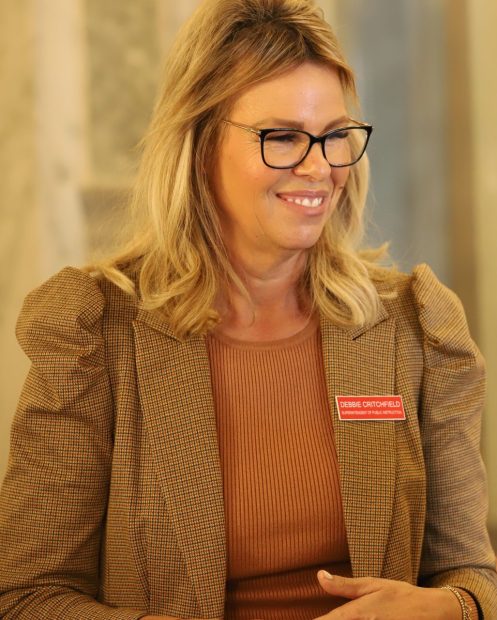Public schools are a step closer to recovering money lost from the recent reversion to an attendance-based funding formula — and districts could have discretion on how most, but not all, of it is spent.
The Legislature’s budget committee Friday advanced a slate of K-12 funding bills, which altogether would increase state spending on public schools by $110.6 million. The Joint Finance-Appropriations Committee already cleared a $3 billion base public schools budget for the upcoming fiscal year. That budget bill is headed to the governor’s desk, after the House and Senate approved it.
Friday’s new budget “enhancements” include roughly $145 million to account for a funding gap primarily caused by this year’s shift from enrollment-based funding to a model based on lower attendance numbers.
The money would be distributed in three tranches:
- $105 million in discretionary funding for fiscal year 2024, which ends June 30.
- $20 million transferred to the school district facilities fund for fiscal year 2025.
- $20 million transferred to the Career Ready Students program for fiscal year 2025.
The funding was one of state superintendent Debbie Critchfield’s priorities for the legislative session. The first-term Republican called on lawmakers to fully deliver on the nearly $380 million K-12 funding increase that lawmakers appropriated last session.

Critchfield initially requested $162 million in discretionary funding for the current fiscal year to plug the hole. That figure was based on December school attendance data, but the gap narrowed to $145 million when February attendance data was analyzed.
“It was a little bit of a moving target,” said Rep. James Petzke, R-Meridian. “We didn’t know exactly what the number was going to be…The bottom line here is that we’re going to make sure that we get every dollar out that was appropriated during fiscal year ‘24 to help schools.”
The $105 million in discretionary funding could go out before the end of the current school year, if the full House, full Senate and Gov. Brad Little approve the budget committee’s recommendation. Districts can use discretionary funding for any expense but they typically spend it on operational costs, such as faculty and staff pay.
“I’m very happy to see that the bulk of it went into discretionary,” Critchfield said after Friday’s committee hearing, “so that our districts could use it in whatever ways fill their gaps at the local end.”
The other $40 million that’s needed to fully address the attendance formula gap would get to schools through a more complex route. JFAC proposed a one-time cash transfer from the Public School Income Fund to two other funds: the school district facilities fund and the Career Ready Students program; $40 million would be split evenly between them.
The school district facilities fund — created last year by House Bill 292, the sweeping property tax relief law — helps districts pay off bonds and levies. Career Ready Students helps districts expand their capacity for career-technical education programs.
Rep. Wendy Horman, who co-chairs the budget committee, touted JFAC’s decision to deliver the school funding despite a sharp decline in support units, the vehicle for K-12 funding that essentially represents the cost to run a classroom. This year, the state’s funding formula produced nearly 700 fewer support units compared to last year. Most of the dropoff was due to the shift back to attendance-based calculations, but a decline in school enrollment also contributed, according to legislative budget analysts.
“Even though we have fewer students, fewer support units, we are making a very heavy investment in school facilities for the students that we do have,” said Horman, R-Idaho Falls.
Facilities bill trailers head to Senate floor
The Senate is poised to vote on four bills that would rework pieces of a complicated school facilities bill.
The Senate State Affairs Committee sent the four “trailer” bills to the Senate floor Friday morning. The moves come a day after the Senate passed the omnibus facilities bill — sending it to Gov. Brad Little, who will almost certainly sign it into law — and the same day that the budget committee advanced an appropriation bill with a portion of the new facilities funding.
The Senate bills could rewind and replace pieces of House Bill 521 — especially the controversial formula for dishing out money for school building projects, and a clause that could discourage schools from operating on a four-day schedule.
“I’m going to try to vote all of these to the floor so we can have a good debate on them,” said Senate Majority Leader Kelly Anthon, R-Burley, before the committee sent the four bills to the full Senate.

Those four votes came after spirited committee debate, and impassioned testimony from rural educators who use a four-day school schedule.
Senators focused their discussion on the funding formula, the mechanism for handing out a historic $1 billion to offset school building costs. As written, HB 521 would distribute money based on student attendance. It also sets a floor; all districts would receive at least $25,000.
Two of the Senate bills would raise that minimum to $100,000, and cap the payment at $100 million.
The increased minimum is designed to help the state’s smallest, rural districts, which still face ongoing building and maintenance costs.
The cap, however, would affect only the West Ada School District, Idaho’s largest district. Under HB 521, West Ada stands to receive $140 million.
Sens. Chuck Winder, R-Boise, and Treg Bernt, R-Meridian, argued vehemently against the cap.
“I’m going to stick up for my school district,” said Winder, who represents a legislative district that takes in a portion of West Ada. “I think this is just another shot at them.”
Sen. Melissa Wintrow bristled at a different cap in HB 521, which none of the Senate bills address. The omnibus bill limits payments to $40 million for Idaho’s three “charter” school districts — which predate statehood and retain unique taxing authority. Boise is one such district.
“Boise is always the one that gets picked on,” said Wintrow, D-Boise.
Genesee superintendent Wendy Moore argued for an increase in the cap, saying a $25,000 payment is inadequate. In her north-central Idaho district, she said, it will cost $17,000 to replace school steps — without even installing railing.
A series of rural educators spoke in favor of a four-day schedule. Schools can adopt a four-day calendar as long as they meet state requirements for minimum classroom hours — and 96 districts and charters have moved to a four-day week. “This is most definitely an issue that should rest with locally elected officials,” said Rob Sauer, superintendent of the Homedale School District, which shifted to a four-day schedule nine years ago.
The Ririe School District made a similar move this school year, using Fridays for teacher collaboration and extra help for students, superintendent Jeff Gee said. The move also helps Ririe recruit teachers who might otherwise go to larger districts, he said.
HB 521 doesn’t expressly ban four-day schools, and might not affect existing four-day schools. But language within the 30-page bill could make it more difficult for schools to convert to a four-day calendar.
The four trailer bills were introduced Thursday — and they come at the 11th hour. Legislative leaders have said they hope to wrap up the 2024 session next week.
School board recall reform heads to governor
The Senate narrowly approved a bill that would bar school board trustees subject to a recall election from making financial decisions on behalf of a district between the election and its certification.
House Bill 645 now heads to the governor’s desk after senators voted 18-16 in favor of it. The bill, from Rep. Mark Sauter, R-Sandpoint, addresses a controversy from the West Bonner School District last year: Recalled trustees tried to hold a special meeting to consider contracts before the recall election was certified.
“What this bill is designed to do is to prevent those people who see their fate, writing on the wall, from tossing a grenade into the cafeteria and walking away from the school district,” said Sen. Geoff Schroeder, R-Mountain Home, who sponsored the legislation in the Senate.
The proposal faced robust opposition led by Sen. Scott Herndon, who sponsored a competing bill that stalled in the House earlier this session. HB 645 would also apply to trustees who survive recall elections, noted Herndon, R-Sagle. Those board members also couldn’t make financial decisions before an election is certified — roughly a week’s time.
“It just seems unfair that when voters just affirmed a sitting elected official we would still strip them of some of their duties for the next seven days,” he said.
The House previously approved the bill on a 47-22 vote.
